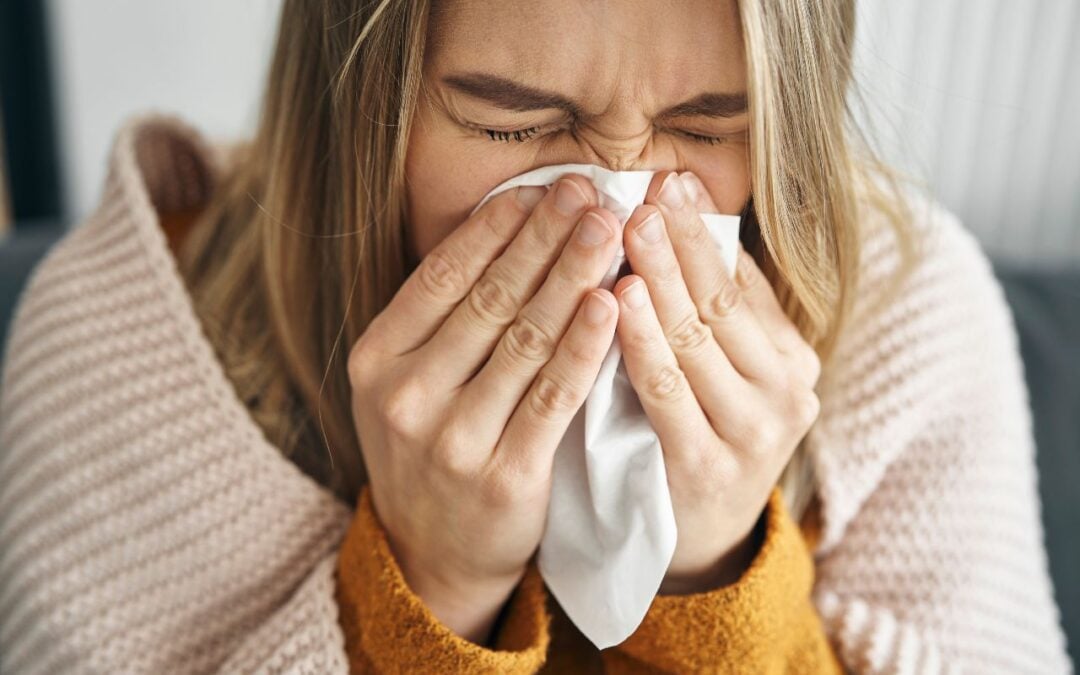The flu season rolls around each year, bringing with it a wave of illness that can affect everyone in the family. Staying healthy and flu-free is top priority, especially since flu viruses can spread easily and sometimes lead to serious complications. Here at Innova Primary Care we want to see you well throughout the entire flu season. In this post, we’ll cover the expected duration of the flu season, share simple ways to protect yourself and your loved ones, and provide the latest info on what to expect this year. Let’s get started on a healthy and happy flu season!
What’s Flu Season and How Long Does It Last?
Flu season generally runs from fall to early spring, with cases peaking between December and February. Here in Huntsville, Alabama we tend to follow the typical trajectory of October to May. The 2024 flu season is expected to follow this usual pattern. During this time, flu viruses are more active, and transmission is higher because people spend more time indoors. Being prepared for these peak months can make a big difference.
Why Protecting Yourself During Flu Season Matters
The flu isn’t just a bad cold—it can lead to severe complications, particularly for children, elderly adults, and people with underlying health conditions like asthma, diabetes, or heart disease. Protecting against the flu isn’t just about avoiding getting sick yourself; it’s also about protecting the vulnerable people around you.
Flu Season Tips for Staying Healthy
Fortunately, there are many ways to reduce the risk of catching or spreading the flu. From vaccinations to simple hygiene tips, let’s dive into some actionable steps you can take.

- Get Vaccinated
Why: The flu vaccine remains the most effective tool in preventing flu infections and lowering the severity of symptoms if you do catch the virus. Each year, flu vaccines are updated to match the most common virus strains circulating. While it is estimated that the 2024 flu vaccine will not be as effective as those in years past due to information from the Southern Hemisphere where the flu spreads earlier in the year, it is still the best defense against severe cases and hospitalizations.
How: Flu vaccines are available at most pharmacies, doctor’s offices, and community health centers. They are recommended for everyone 6 months and older, with higher-dose options available for those 65 and older.
Timing: It’s best to get vaccinated before flu season peaks, ideally in October, to ensure your body has time to build immunity.
- Practice Good Hand Hygiene
Why: The flu virus spreads through tiny droplets that can land on surfaces and stay infectious for hours. Touching contaminated surfaces and then touching your face can lead to infection.
How: Wash your hands frequently with soap and warm water for at least 20 seconds, especially after being in public places. If soap isn’t available, use an alcohol-based hand sanitizer with at least 60% alcohol.
- Cover Your Coughs and Sneezes
Why: Coughing and sneezing releases flu viruses into the air, putting those nearby at risk.
How: Always cover your mouth and nose with a tissue or use the inside of your elbow if you don’t have a tissue. Be sure to throw used tissues away immediately and wash your hands afterward.
- Avoid Close Contact with Sick Individuals
Why: The flu spreads easily in close quarters. If someone in your household or workplace is sick, keeping your distance can help reduce your risk of catching the virus.
How: If possible, try to stay at least six feet away from anyone showing flu symptoms. If you or a family member becomes sick, isolate the person in a separate room if you can and disinfect surfaces regularly. If you contract the flu, stay home! Do not risk contaminating anyone else and keep yourself at home while you are sick.
- Boost Your Immune System with Healthy Lifestyle Habits
Why: A strong immune system is better equipped to fight off viruses, including the flu.
How: Get plenty of sleep (7-9 hours for adults, 8-10 for teens, and 9-12 for younger children), eat a balanced diet rich in fruits, vegetables, and lean protein, and stay active. Regular exercise helps keep your immune system functioning optimally.
- Stay Hydrated
Why: Staying hydrated supports your immune system and helps your body combat illness.
How: Drink plenty of water throughout the day. Avoid excessive caffeine and sugar, which can dehydrate you. Herbal teas, especially those with ingredients like ginger or echinacea, can be soothing and help you stay hydrated.
- Keep Commonly Touched Surfaces Clean
Why: Flu viruses can live on surfaces for hours, meaning that doorknobs, light switches, phones, and other frequently touched items can harbor viruses.
How: Use disinfectant wipes or sprays on these surfaces daily, especially if someone in the household is sick. Don’t forget personal items like cell phones and computer keyboards, which are frequently touched.
- Watch for Symptoms Early
Why: Early detection of flu symptoms can help you or a family member get treatment sooner, which can lead to faster recovery and prevent spreading the virus to others.
How: Common symptoms of the flu include fever, chills, sore throat, body aches, fatigue, and sometimes vomiting or diarrhea. If you or someone in your family starts showing these symptoms, it’s best to stay home, rest, and avoid contact with others until the fever has been gone for at least 24 hours without medication.
What to Do if You or a Family Member Gets the Flu
If someone in your household does catch the flu, it’s essential to take steps to manage symptoms and prevent the virus from spreading. Here are some tips:
- Rest and Recover: Encourage plenty of rest. Staying in bed helps the body recover and limits the spread of the virus.
- Stay Hydrated: Keep hydrated with water, herbal tea, or electrolyte drinks.
- Consider Over-the-Counter Medications: Over-the-counter medications can help relieve symptoms like fever, aches, and congestion. Follow dosage instructions carefully.
- Consult Your Healthcare Provider if Needed: If symptoms are severe or someone in a high-risk group gets the flu, consult a healthcare provider. In some cases, antiviral medications can reduce the severity and duration of symptoms if taken within the first 48 hours.
Flu Season and COVID-19: Double the Vigilance
Since COVID-19 continues to circulate, it’s possible to catch both viruses at once, which can increase the severity of symptoms. Many of the same precautions, like hand washing, mask-wearing in crowded indoor spaces, and vaccination, can protect against both flu and COVID-19.

Wrapping Up: Stay Prepared and Proactive This Flu Season
By following these simple steps, you can help protect yourself and your family during flu season. Getting vaccinated, practicing good hygiene, and adopting a few extra habits can make all the difference in keeping flu out of your home. While it’s impossible to eliminate the risk completely, these efforts greatly reduce your chances of getting sick.
Staying aware of flu season trends and keeping up with health recommendations will help you stay one step ahead. If you suspect you are coming down with the flu, please do not hesitate to reach out to Innova Primary Care and let us do a flu test for you. It is a quick and painless test which will arm you with information to help yourself and those you love. Here’s to a healthy, flu-free season for you and your loved ones!



 About
About

 About
About About
About About
About
 About
About About
About

 About
About About
About About
About About
About











